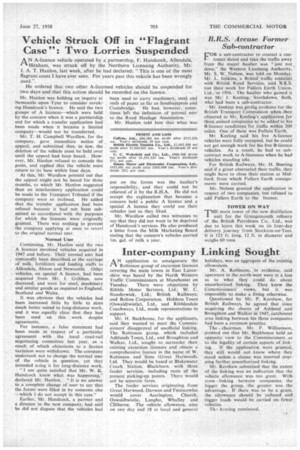Vehicle Struck Off in "Flagrant Case": Two Lorries Suspended
Page 45

If you've noticed an error in this article please click here to report it so we can fix it.
A N A-licence vehicle operated by a partnership, F. Handcock, Allendale, "Hexham, was struck off by the Northern Licensing Authority, Mr. J. A. T. Hanlon, last week, after he had .declared: "-This is one of the most flagrant eases I have ever seen. For years past this vehicle has been wrongly used."
He ordered that two other A-licensed vehicles should be suspended for two days and that this action should be recorded on the licence.
Mr. Hanlon was holding an inquiry at Newcastle upon Tyne to consider revok-' ing Handcock's licence. He said the two groups of A licences—which were held by the concern when it was a partnership and for which a transfer application had been made when it became a limited company—would not be transferred.
Mr. T. H. Campbell Wardlaw, for the company, gave immediate notice of appeal, and submitted that, in law, the deletion of the vehicle must be held over until the appeal had been heard. However, Mr. Hanlon refused to concede the point, and replied that the vehicle must return to its base within four days.
At this, Mr. Wardlaw pointed out that the appeal might not be heard for three months, to which Mr. Hanlon suggested than an interlocutory application could be made to the Transport Tribunal if the company were so inclined. He added that the transfer application had been refused because it had not been submitted inaccordance with the purposes for which the licences were originally granted. There was nothing to prevent the company applying at once to revert to the original normal user.
Normal User .
Continuing, Mr..Hanlon said the two A licences involved vehicles acquired in 1947 and before. Their normal user had repeatedly been described, as the carriage of milk, fertilizers and feeding stuffs to Allendale, Alston and Newcastle. Other vehicles, on special A licence, had been acquired from Mr. J. Gribben, now deceased, and were for steel, machinery and similar goods as required to England, Scotland and Wales.
It was obvious that the vehicles had been increased little by little to sizes much better suited to long-distance work, and it was equally clear that they had been used on this work despite agreements. • For instance, a false statement had been made in respect of a particular agreement with the local road-rail negotiating committee last year, as a result of which objections to a licence variation were withdrawn. The company undertook not to change the normal user of the vehicle in question, yet they intended using it for long-distance work.
"I am quite satisfied that Mr. W. K Hancicock knew what was happening," declared Mr. Hanlon. "It is no answer to a complete change of user to say that the forms were filled in by someone else —which I-do not accept in this case."
Earlier, Mr. Handcock, a partner and a director in the new company. had said he did not dispute that the vehicles had been used to carry machinery, steel and reels of paper as far as Southampton and Coatsbridge. He had, however, sometimes left the definition of normal user to the Road Haulage Association.
Mr. Hanlon told him that what was put on the forms was the haulier's responsibility, and they could not be relieved of it by the R.H.A. He did not accept the explanation that because a concern held a public A licence and a special A licence they could use their vehicles just as they liked.
Mr. Wardlaw called two witnesses to say that they did not want to be deprived of Handcock's services. He also produced a letter from the Milk Marketing Board stating that the concern's vehicles carried lm. gal. of milk a year.








































































































































